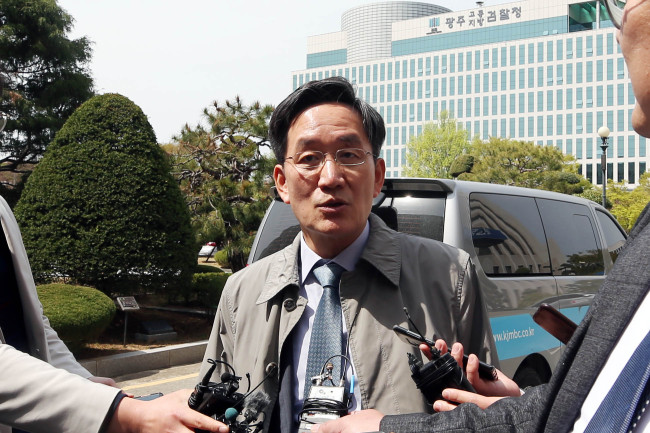Former President Chun Doo-hwan on Monday once again denied in court that military helicopters shot at civilians during a pro-democracy uprising in Gwangju in May 1980.
Chun did not show up for a preparatory hearing at the Gwangju District Court on Monday for his trial on charges that he defamed the dead.
Chun’s lawyer Chung Joo-kyo objected to about one-third of the evidence that prosecutors submitted, including a report by a special panel of the Defense Ministry and a National Forensic Service report on its examination of bullet marks on the Jeonil building in Gwangju.
 |
Chun’s lawyer Chung Joo-kyo (Yonhap) |
Chun’s lawyer also objected to the use of recent news articles on testimonies by witnesses of the helicopter gunfire; witnesses’ statements; some documents written by the Defense Ministry at the time of the military crackdown on the uprising in 1980; and some investigation and trial files from 1995 that the prosecution submitted as evidence.
Chung agreed with the use of most of the prosecution’s investigation records from 1995 and investigation records of the National Assembly and the Martial Law Command as evidence.
“Most of it is evidence containing hearsay,” Chun’s lawyer said.
“As for the bullet marks on the Jeonil building, additional investigation is necessary to find out how it was possible when there were no rifles on the helicopters, and how so many bullet marks were found in only one room on the 10th floor.”
It has been the government’s position for the past decades that it cannot recognize the claims of helicopter gunfire as facts, he said.
“There are people who say they saw it, but the helicopter pilots say they never did it. The memoir (of Chun) is merely an individual’s opinion on a social controversy,” he said.
Chun wrote in his memoir published in April 2017 that a late Catholic priest, Cho Pius, was “a shameless liar who does not deserve the title of a religious priest,” accusing him of lying that he saw military helicopters shooting at people in Gwangju in 1980.
Chun also called Cho “Satan wearing a mask” in the book.
Chun’s lawyer said it was a violation of jurisdiction to have him tried in Gwangju and that prosecutors induced bias on the bench by recording charges that Chun “led the bloody suppression of the Gwangju Democratization Movement,” which are irrelevant to the libel charges, in the arraignment.
The prosecution has refuted the lawyer’s claims, saying that Chun’s memoir was distributed in Gwangju and referring to the “criminal intent” shown in the foreword of the book.
“Libel on the internet has no limits on where the crime took place. The memoir was distributed in Gwangju, hence it can be seen as the place where the results of the libel took place,” they said.
“Chun claims that he did not order the helicopter shootings and that he was not in a position to know about them, but (we) sought to make clear the fact that he could have been aware of those facts, albeit with doubt.”
By Kim So-hyun (
sophie@heraldcorp.com)







![[Today’s K-pop] Blackpink’s Jennie, Lisa invited to Coachella as solo acts](http://res.heraldm.com/phpwas/restmb_idxmake.php?idx=644&simg=/content/image/2024/11/21/20241121050099_0.jpg)
